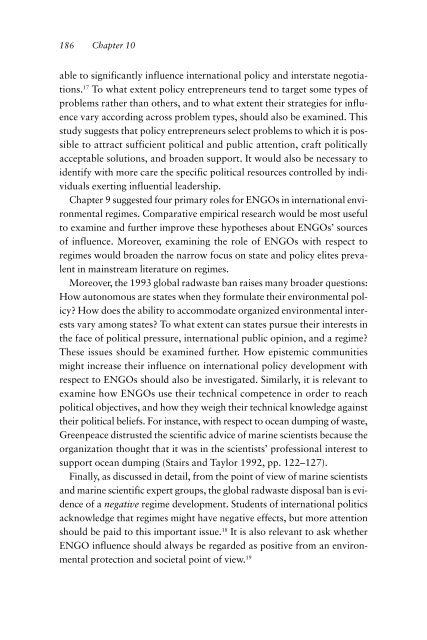Radioactive Waste Disposal at Sea: Public Ideas ... - IMO
Radioactive Waste Disposal at Sea: Public Ideas ... - IMO
Radioactive Waste Disposal at Sea: Public Ideas ... - IMO
Create successful ePaper yourself
Turn your PDF publications into a flip-book with our unique Google optimized e-Paper software.
186 Chapter 10<br />
able to significantly influence intern<strong>at</strong>ional policy and interst<strong>at</strong>e negoti<strong>at</strong>ions.<br />
17 To wh<strong>at</strong> extent policy entrepreneurs tend to target some types of<br />
problems r<strong>at</strong>her than others, and to wh<strong>at</strong> extent their str<strong>at</strong>egies for influence<br />
vary according across problem types, should also be examined. This<br />
study suggests th<strong>at</strong> policy entrepreneurs select problems to which it is possible<br />
to <strong>at</strong>tract sufficient political and public <strong>at</strong>tention, craft politically<br />
acceptable solutions, and broaden support. It would also be necessary to<br />
identify with more care the specific political resources controlled by individuals<br />
exerting influential leadership.<br />
Chapter 9 suggested four primary roles for ENGOs in intern<strong>at</strong>ional environmental<br />
regimes. Compar<strong>at</strong>ive empirical research would be most useful<br />
to examine and further improve these hypotheses about ENGOs’ sources<br />
of influence. Moreover, examining the role of ENGOs with respect to<br />
regimes would broaden the narrow focus on st<strong>at</strong>e and policy elites prevalent<br />
in mainstream liter<strong>at</strong>ure on regimes.<br />
Moreover, the 1993 global radwaste ban raises many broader questions:<br />
How autonomous are st<strong>at</strong>es when they formul<strong>at</strong>e their environmental policy?<br />
How does the ability to accommod<strong>at</strong>e organized environmental interests<br />
vary among st<strong>at</strong>es? To wh<strong>at</strong> extent can st<strong>at</strong>es pursue their interests in<br />
the face of political pressure, intern<strong>at</strong>ional public opinion, and a regime?<br />
These issues should be examined further. How epistemic communities<br />
might increase their influence on intern<strong>at</strong>ional policy development with<br />
respect to ENGOs should also be investig<strong>at</strong>ed. Similarly, it is relevant to<br />
examine how ENGOs use their technical competence in order to reach<br />
political objectives, and how they weigh their technical knowledge against<br />
their political beliefs. For instance, with respect to ocean dumping of waste,<br />
Greenpeace distrusted the scientific advice of marine scientists because the<br />
organiz<strong>at</strong>ion thought th<strong>at</strong> it was in the scientists’ professional interest to<br />
support ocean dumping (Stairs and Taylor 1992, pp. 122–127).<br />
Finally, as discussed in detail, from the point of view of marine scientists<br />
and marine scientific expert groups, the global radwaste disposal ban is evidence<br />
of a neg<strong>at</strong>ive regime development. Students of intern<strong>at</strong>ional politics<br />
acknowledge th<strong>at</strong> regimes might have neg<strong>at</strong>ive effects, but more <strong>at</strong>tention<br />
should be paid to this important issue. 18 It is also relevant to ask whether<br />
ENGO influence should always be regarded as positive from an environmental<br />
protection and societal point of view. 19

















